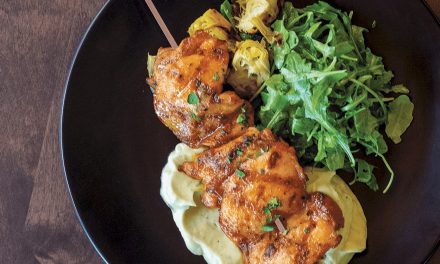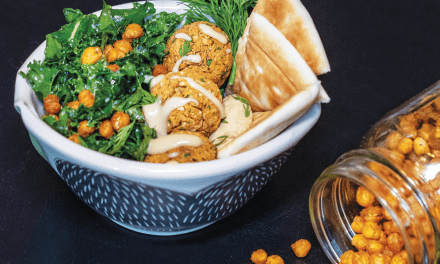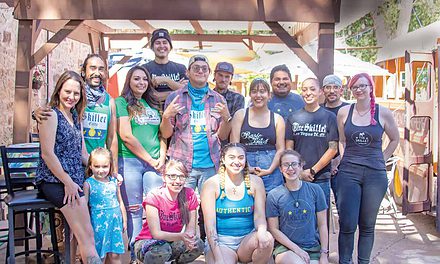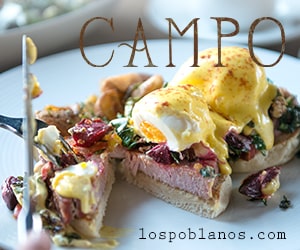Mi Young’s Farm Korean Seoul Food Kimchi
Is Food for Health and Happiness
Words and Photos by Ungelbah Dávila-Shivers

Jenn Yi at 50/50 Coffee House & Pub in Albuquerque, where she makes her kimchi.
Jenn Yi lifts the earthy-brown lid of her ceramic crock, revealing a blend of cabbage, ginger, garlic, green onions, daikon radishes, serrano peppers, fish sauce, and salt. In only its first of a three-to-four-day-long salt fermentation process, this batch of Mi Young’s Farm Korean Seoul Food Kimchi still resembles soup more than the probiotic-rich superfood and staple of Korean cuisine. A ceramic weight, in the shape of a half moon, floats on top, keeping the vegetables submerged in their brine. Over the next few days, Yi will smell, taste, look at, and listen to her kimchi to know when it is ready, in a practice-perfected and instinct-driven process that she has inherited from a very long line of Korean kimchi masters.
“For me, kimchi is soul food that really connects me to my childhood in Korea,” says Yi, who lovingly creates her kimchi in the kitchen at 50/50 Coffee House & Pub near UNM’s main campus in Albuquerque. Currently, Yi’s kimchi is sold by the pint jar at Tiny Grocer ABQ and Keller’s Farm Store in Albuquerque, at Polk’s Folly Farm Butcher Shop & Farm Stand in Cedar Crest, at Barrio Brinery in Santa Fe, and through the New Mexico Harvest community supported agriculture (CSA) program. This year Yi and her kimchi will also be making an appearance at the Santa Fe Farmers Market and at the Downtown Growers’ Market and Rail Yards Market, both in Albuquerque.
Yi’s signature line of Mi Young’s Farm Korean Seoul Food Kimchi includes a chile-free mild recipe that has all of the flavor of her other kimchi minus the heat, a traditional Korean blend with some spice, plus an extra spicy and a fire hot for those who enjoy a more fiery flavor. She also offers a vegan option that tastes much like the traditional but without the fish sauce. Her newest creation stars daikon radishes, fermented in kimchi fashion, that have a pickled flavor all their own, as well as a striking pink color that occurs naturally in the brining process.

Because lactic acid, the bacteria that creates the probiotics in kimchi during fermentation, is present to some degree in almost all vegetation, Yi says it’s easy to get creative with salt fermentation. Every batch of kimchi is started from scratch, meaning she uses no mother brine or starter; rather, she uses salt to “sweat out” the liquids in the vegetables to create their own brine. In the summer, she makes a cucumber kimchi, and she has made an apple kimchi with fruit from Montoya Orchard in Velarde, where she farms. In Korea, some types of kimchi follow the seasons and what products are available in specific provinces, resulting in delicacies such as bossam kimchi that incorporates seafood and nuts. Yi tries to honor this tradition when making her seasonal variations.
“Customers tell me, ‘I’ve been feeling so much better since eating your kimchi.’ I tell them, ‘Ninety percent of serotonin is created in the gut, and probiotics in kimchi are good for the gut.’ So, I see kimchi as a happy food,” says Yi. “I don’t work if I’m having an off day. I believe in putting good energy into my kimchi. Sometimes I even dance with my cabbages!”
Yi, who was born in Seoul, spent her childhood in Korea, where she says kimchi is “serious business,” with a museum completely devoted to it. Most households, she says, have a refrigerator specifically for storing their kimchi. Because kimchi is fermented at room temperature, it is often made at home using recipes passed from generation to generation. The tangy, tantalizing scent of kimchi is as much a part of the essence of Korean life as the dish itself, which accompanies most meals.
Her jar of kimchi makes a fizzy noise as she cracks it open for a tasting, and the air fills with a deliciously savory garlic and vinegar aroma. “Each batch of kimchi is unique,” she says. “It’s a living food, so some batches are more lively than others.”
When Yi immigrated to the United States more than twenty years ago, kimchi was among the things she missed the most. In 2013, she created Mi Young’s Farm, named after her daughter, with her then husband. She began selling her kimchi at the Santa Fe Farmers’ Market in 2014, created from their homegrown and locally sourced produce. A few years later she also started wholesaling Mi Young’s Farm Korean Seoul Food Kimchi to restaurants and grocery stores.
“I was able to make a name for myself at the Santa Fe Farmers’ Market with my kimchi pancakes,” says Yi, who relocated to Albuquerque two years ago. But, as with so many, the unprecedented events of 2020 forced her to pivot her business model. “Because of the pandemic, I couldn’t sell food. I wondered if I’d even be able to keep my business alive.”
To stay afloat, Yi grew a variety of produce last year that she could sell at the farmers market. Utilizing portions of friends’ farmland in Velarde and the Albuquerque South Valley, she put in twelve one-hundred-foot rows of cabbages and purple daikon radishes for her kimchi, as well as iceberg lettuce, collard greens, carrots, beets, kale, and other produce to sell.
The silver lining of the pandemic, she says, is that it’s given her the freedom to experiment with different kimchi recipes. She’s developed a special green chile–infused kimchi for a local food truck that has done so well she’s considering adding it to her existing line of flavors.
“Kimchi is at the heart of everything I do,” says Yi, who hopes to grow awareness throughout the state about Korean food and the health benefits of kimchi. She hints at a possible ghost kitchen project later this year for different Korean street food recipes she’s developing.
Aside from adding kimchi on the side of meals, like a salsa, she teaches her customers to get creative. Kimchi makes a wonderful addition to a Bloody Mary, she says, and grinding it up with sprouted mung beans and a bit of water makes a batter that can be turned into the pancakes she’s so well known for. This year she will be selling her kimchi pancakes at the farmers markets again, but prepackaging them in stacks of five.
“Kimchi ties together all the most important things in my world,” says Yi. “My mother, my daughter, my culture, and this land. I’m grateful to be able to turn it into a livelihood.”
Edible celebrates New Mexico's food culture, season by season. We believe that knowing where our food comes from is a powerful thing. With our high-quality, aesthetically pleasing and informative publication, we inspire readers to support and celebrate the growers, producers, chefs, beverage and food artisans, and other food professionals in our community.

















